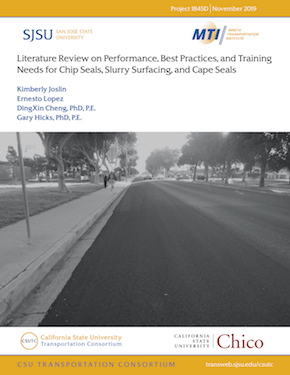- 408-924-7560
- mineta-institute@sjsu.edu
- Donate
Literature Review on Performance, Best Practices, and Training Needs for Chip Seals, Slurry Surfacing, and Cape Seal
The objective of this study is to document the performance, best practices, and training needs of various pavement preservation treatments, accounting for the factors that affect the performance of the treatments. Treatments covered in this document include chip seals, slurry seals, microsurfacing, and cape seals.
The literature review in this report covers local, national, and international practices. The information gathered from the various studies was cross-referenced with similar reports for accuracy and to obtain common consensus for each of the treatments being evaluated. Performance data, along with the development of best construction practices for specific treatment types, will aid transportation agencies in becoming familiar with pavement management systems. With this knowledge, the use of these systems will aid in the tracking and maintenance of road networks. Within this literature review is a section that discusses pavement management systems (PMSs) used. Pavement management systems in California include StreetSaver and PaveM; StreetSaver is most commonly used by local agencies and PaveM is utilized by Caltrans.
The performance of chip seals, slurry surfacing, and cape seals was researched, including identification of the factors affecting performance of each treatment type, as well as observations and data from agencies who have documented the performance and behavior of treatments over several years.
The last topic covered was identifying training needs for the preservation treatments presented. This section of the document sets out the training and knowledge required to facilitate improved and more reliable performance of preservation treatments.
KIMBERLY JOSLIN
Kimberly Joslin is an undergraduate senior, graduating Spring 2019. She has been working at the California Pavement Preservation Center (CP2C) since Fall 2017 and plans to continue the work until graduation. Her work has included editing and formatting the CP2C quarterly newsletter, utilizing the StreetSaver program to provide agencies with optimal scenarios and budgets to improve their roadways, and report research and writing. In addition, she has aided in a few laboratory studies on materials testing. Some notable tasks include Phoscrete prep and load testing, Riverside County budget analysis report, literature reviews, and TDA Handbook revisions. In addition, she has also assisted in the creation of modules for CalRecycle. The year spent at the Center has provided her with knowledge and technical skills that will be taken into her career after graduation.
ERNESTO LOPEZ
Ernesto Lopez is an undergraduate senior, graduating Fall 2018. He has knowledge of engineering practices and technology. He has been working at the California Pavement Preservation Center (CP2C) since the summer of 2018. His work has included fieldwork data collection, revisions, research, and writing of reports. In addition, he has aided in laboratory studies for materials testing. Some notable tasks include the South Campus Neighborhood report, distress mapping in Caltrans District 9, Distress mapping in Alameda (CA), Tire Derived Aggregate (TDA) Handbook revision, and assisting with Phoscrete prep and load testing. Working at the CP2C has provided Lopez with experience in transportation and an interest in pursuing a career in the transportation industry.
DINGXIN CHENG, PhD, PE (TEXAS)
Dr. DingXin (Ding) Cheng is a professor of the Department of Civil Engineering at California State University, Chico, director of the California Pavement Preservation (CP2) Center, and the director of the Tire Derived Aggregate Technology Center. He has worked actively with the CP2 Center since he joined the Department of Civil Engineering at CSU Chico in 2006. He obtained his PhD in the areas of pavement materials and transportation from Texas A&M University in College Station, Texas, in 2002. He worked in private industry for Parsons Brinckerhoff in Houston, TX before joining Chico State University. He has extensive experiences in Hot Mix Asphalt (HMA) materials and pavement preservation on both asphalt and concrete pavements. He has more than 55 peer-reviewed publications related to pavement materials and preservation in Transportation Research Board, AAPT, ASCE, and other conferences. Ding has co-managed or managed more than $7 million in research projects funded by the California Department of Transportation (Caltrans), California’s Department of Resources Recycling and Recovery (CalRecycle), the Metropolitan Transportation Commissions (MTC) of San Francisco Bay Area, and other agencies and industry. He is a registered Civil Engineer in the state of Texas.
R. GARY HICKS, PhD, PE
Dr. Hicks is currently program manager for the CP2 Center at CSU Chico. Prior to joining the Center, he taught at Georgia Tech and Oregon State University for 30 years, rising to a Distinguished Profess of Civil Engineering and the Associate Dean for Research for the College of Engineering. He retired from OSU in 1997, and upon retirement embarked on a consulting career with MACTEC Engineering (now Wood LLC) providing on-call consulting services to the California Department of Transportation, as well as other organizations. As a part of this project, he led the development of the MTAG and helped set up the CP2 Center in 2006. He is a registered Civil Engineer in the states of California, Oregon, and Alaska.
-
Contact Us
San José State University One Washington Square, San Jose, CA 95192 Phone: 408-924-7560 Email: mineta-institute@sjsu.edu






